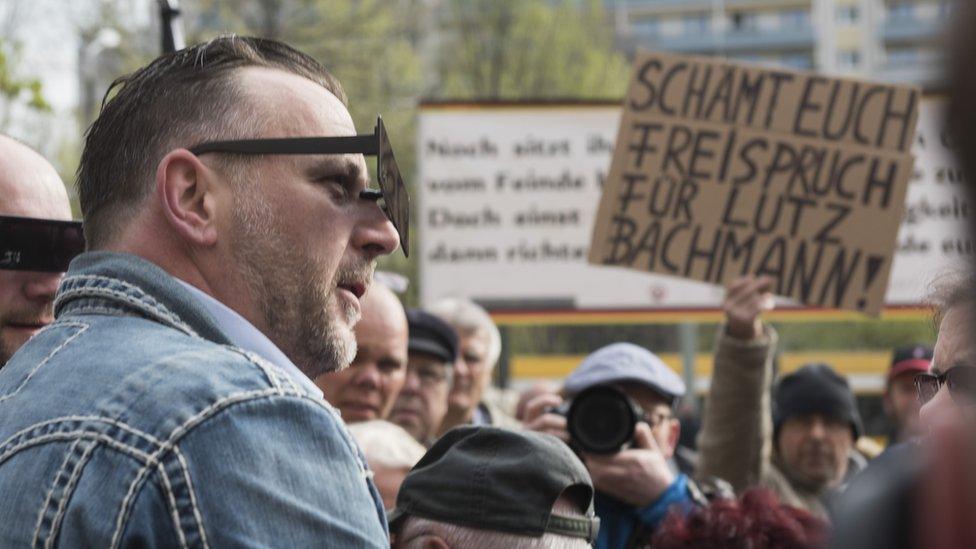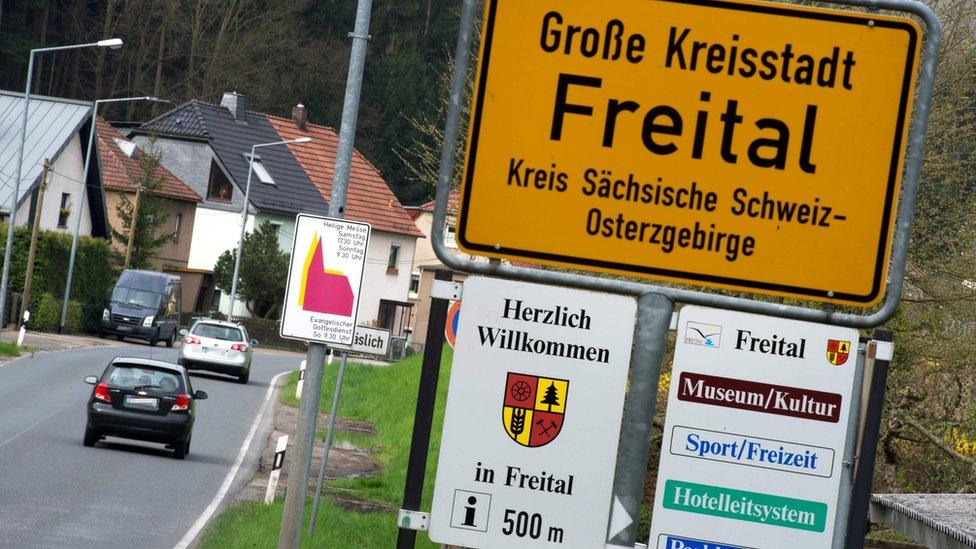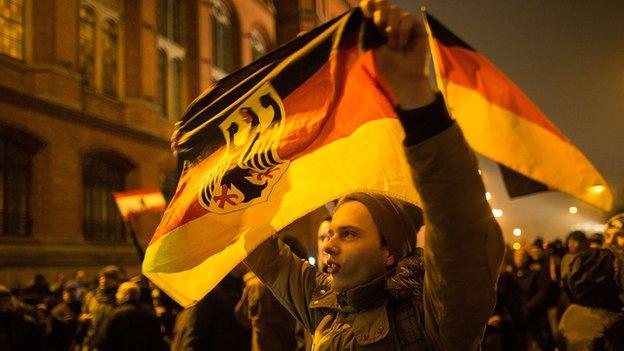German far-right Pegida founder Bachmann in race trial
- Published

Lutz Bachmann, who faces a potential jail term, spoke to supporters before entering court
The founder of Germany's anti-Islamist Pegida movement has gone on trial in Dresden on hate speech charges.
Lutz Bachmann, 43, is accused of inciting racial hatred in Facebook posts, in which he called refugees "cattle", "scumbags" and "filth".
Pegida's rallies have attracted thousands of supporters in Germany.
Separately, police arrested five suspects near Dresden accused of attacking migrant hostels and plotting far-right, anti-immigrant terror.
Tuesday's police raid in Freital, involving a GSG9 anti-terror unit, was not linked to the trial.
Investigators suspect four men and a woman, aged from 18 to 40, of far-right violence against migrants. Three other men were arrested last November.
The group is suspected of targeting refugee accommodation in Freital and a left-wing housing project in Dresden with explosive devices in attacks last autumn. Investigators found a cache of banned firecrackers considered so dangerous that the group is suspected of attempted murder.

Two attacks were carried out on refugee accommodation in Freital
The group is also linked to attacks on a left-wing councillor's car as well as a party office in Dresden.
Interior Minister Thomas de Maiziere said authorities had dealt a "powerful blow to a regional right-wing terrorist group".
Criminal past
Lutz Bachmann's trial was being held amid tight security in Dresden. The Pegida founder claims it is politically motivated and wore large, rectangular dark glasses in an apparent swipe at German censorship rules.
Outside court, supporters held banners reading "Shame on you! Acquit Bachmann" while opponents shouted "Bachmann behind bars".
The movement has spread to numerous countries since its launch in the eastern German city in 2014.

Pegida began in Dresden in 2014 and continues to attract support for its Monday rallies
There were 1,005 attacks on refugee homes in Germany last year - five times more than in 2014.
Mr Bachmann has several previous convictions and has served time in jail before. In 1998 he was sentenced to three years and eight months for several burglaries, but he then fled to South Africa.
After extradition, for an invalid visa, he served 14 months in jail in Dresden. In 2010 he was given a two-year suspended sentence for possession of cocaine.
Pegida was prominent in demonstrations in Cologne in January after numerous complaints of sexual assaults against women in the city on New Year's Eve.
The attacks were largely blamed on people from North Africa who entered Germany illegally or have sought asylum. No trials involving suspects from the Cologne assaults have taken place.
Pegida's anti-immigration demonstrations have often been met by counter protests.
The court says Mr Bachmann "disrupted public order" through his comments, which constituted an "attack on the dignity" of refugees.
If found guilty, he could face between three months and five years in prison.

What is Pegida?
Acronym for Patriotische Europaeer Gegen die Islamisierung des Abendlandes (Patriotic Europeans Against the Islamisation of the West)
Umbrella group for German right-wingers, attracting support from mainstream conservatives to neo-Nazi factions and football hooligans
Holds street protests against what it sees as a dangerous rise in the influence of Islam over European countries
Claims not to be racist or xenophobic
19-point manifesto, external says the movement opposes extremism and calls for protection of Germany's Judeo-Christian culture
- Published13 January 2015

- Published21 January 2015
